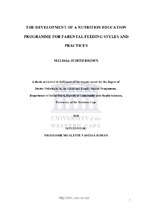| dc.contributor.advisor | Roman, Nicolette Vanessa | |
| dc.contributor.author | Melissa Judith Brown | |
| dc.date.accessioned | 2021-03-19T07:06:46Z | |
| dc.date.issued | 2020 | |
| dc.identifier.uri | http://hdl.handle.net/11394/7999 | |
| dc.description | Philosophiae Doctor - PhD | en_US |
| dc.description.abstract | Many low- and middle-income countries are faced with a rise in the double burden of malnutrition
- undernutrition and overweight/obesity. Nutrition-related factors contribute to approximately 45%
of deaths in children under five years (mainly due to undernutrition) globally, while low- and
middle-income countries are simultaneously witnessing a rise in childhood overweight and
obesity. In 2016, an estimated 41 million children under the age of five in low- and middle-income
countries were overweight or obese, while 155 million were chronically undernourished. In Africa
alone, the estimated prevalence of overweight and obese children in 2010 was 8.5%, expected to
reach 12.7% in 2020. In comparison, globally, one in nine people are either hungry or
undernourished, while one in three people are overweight. | en_US |
| dc.language.iso | en | en_US |
| dc.publisher | University of Western Cape | en_US |
| dc.subject | Nutritional knowledge | en_US |
| dc.subject | Parenting styles | en_US |
| dc.subject | Parenting feeding practice | en_US |
| dc.subject | Social learning theory | en_US |
| dc.subject | Intervention mapping | en_US |
| dc.title | The development of a nutrition education programme for parental feeding styles and practices | en_US |
| dc.rights.holder | University of Western Cape | en_US |
| dc.description.embargo | 2024 | |

